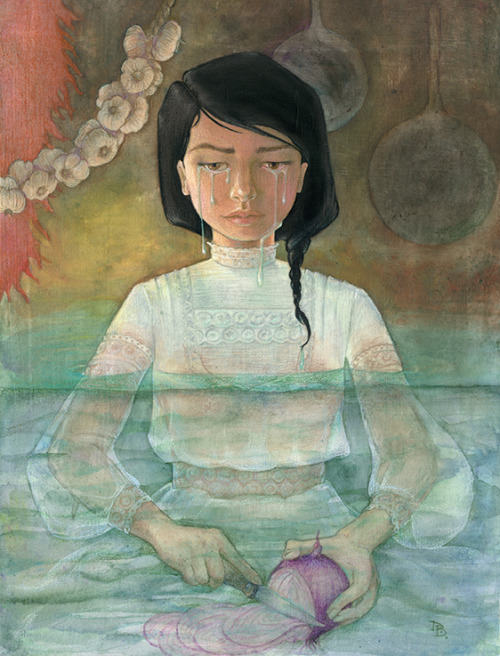As with any story, Like Water for Chocolate address various social issues, usually designed around the context of the time. Considering the era that the story took place, late 19th C. to early 20th C., it was quite revolutionary in its ideas. As a final look at the novel, Like Water for Chocolate, it's important to look at how the novel is designed around the ideas of sexuality, race, and gender. The plot has an interesting points of views, as it has the ability to look outside the typical social design, with the excuse of magic, a concurrent political revolution, and the extraneous circumstances of lust.
Tuesday, April 28, 2015
Monday, April 13, 2015
Food as a Metaphor
In the story, Like Water for Chocolate, the principle medium for magical realism is food. Tita makes and prepares the food while transmitting her emotions through food, allowing everyone who eats her food to share these feelings with her. This story is good example of magical realism, because the setting and action are very mundane, completely ordinary, however, there is magic within this ordinary living when Tita discovers she posses this power after her mother forbids her to marry. Forcing Tita to spend her youth taking care of her mother because it is her 'job' as the youngest daughter. After losing the love of her life, Pedro, to her sister, Rosuara, her hurting is passed through the food and everyone who eats it feels an agonizing longing.
Tita grows up and accepting and conforming to traditions that define and also stereotype women. Tradition is also a key element in magical realism, combining old morals and beliefs while using fantasy as a coping mechanism, in this case her food. She does however find satisfaction in these traditional roles. Although she is also trapped by socialization as her feminine sense of duty, she finds comfort in feeding those who are hungry and seems to really enjoy working in the kitchen. When Pedro and Rosuara's newborn son Roberto becomes hungry, even Tita can some how magically feed him with her very own breast milk although she happens to be a virgin.
Christmas Rolls

Turkey Mole with Almonds and Sesame Seeds


Another ethical issue is Pedro's desire for Tita. After asking Mama Elena for Tita's hand in marriage, Mama Elena refuses and tells him to marry her other daughter, Rosaura, so she could keep Tita to herself. Pedro, not even considering other options to stay with Tita, takes her offer because he believes its better than nothing. But his intentions are wrong if he thinks that he can have a baby with Rosaura and still have sexual relations with Tita. Tita considers her love for Pedro never ending, fueling so much passion through her food, but although Pedro is attracted to her, it does not appear to be the same love Tita has for him. He has personal ambitions on sleeping with Tita and staying with his wife at the same time.

Works Cited
Tita grows up and accepting and conforming to traditions that define and also stereotype women. Tradition is also a key element in magical realism, combining old morals and beliefs while using fantasy as a coping mechanism, in this case her food. She does however find satisfaction in these traditional roles. Although she is also trapped by socialization as her feminine sense of duty, she finds comfort in feeding those who are hungry and seems to really enjoy working in the kitchen. When Pedro and Rosuara's newborn son Roberto becomes hungry, even Tita can some how magically feed him with her very own breast milk although she happens to be a virgin.
Christmas Rolls

Turkey Mole with Almonds and Sesame Seeds
In one scene, Tita's other sister
Gertrudis, seems to also have some kind of power after eating Tita's
food. she decides to bathe although her passion, presented through
Tita's cooking, is enough to light the bath house on fire. The smell
of her cooking is so strong that another man far away is able to find
Gertrudis through this and steals her away.


This story takes place during the
Mexican revolution- taking place in very cultural area where men
predominately run and rule everything. Ironically, Mama Elena who
believes tradition is everything, manages to be dictator of her
ranch. Making all the rules that her daughters must obey, even if
they do not like the rules. She even expresses that she has single
handily done everything on her own, without the help of a man,
deeming men as unnecessary. The Mexican revolution is also symbolic
of change and a time of new ideas.
Works Cited
Moore, Lindsey. "Postcolonial Studies - Magical Realism." Scholarblogs Emory. Emory University, 1998. Web. 24 Mar. 2015.
Rogers, Bruce Holland. "What Is Magical Realism, Really?" What Is Magical Realism, Really? N.p., 2002. Web. 09 Mar. 2015. <http://www.writing-world.com/sf/realism.shtml>.
Subscribe to:
Posts (Atom)
